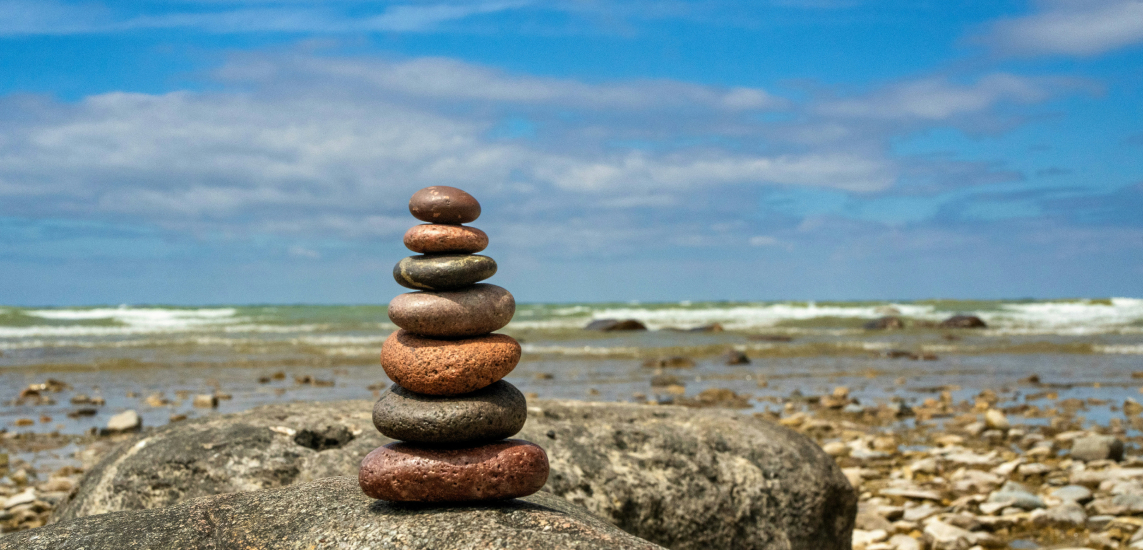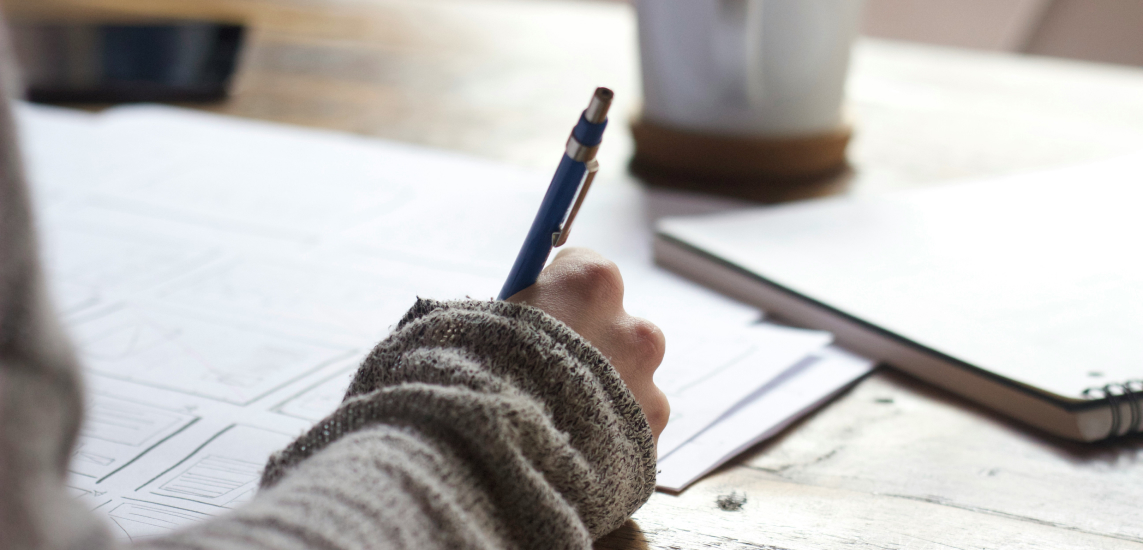Dr. Jan Russell and Keziah Gibbons created a short and empowering course on psychologically informed practices that help to turn stress into calm. This article gives an overview of the five different practices and their use as some of us negotiate our way out of lockdown.
Psychologically Informed Practices For Personal And Communal Resilience
COVID-19 has brought us some interesting challenges and opportunities. Whole communities are thrust into an unusual transition, united by the urge for safety and security, and by the universal experience of ‘not knowing’. We have responded to the demands of lockdown with more or less ease, most of us with some ups and downs, and now we are moving cautiously toward the other side, tentative steps back out into the big wide world. For some, there is a lot to recover from. For us all, transition is only just beginning.
Read more: When we take a look at the habits of the mind, we might notice the tendency we have to draw quick conclusions. Explore how to cultivate curiosity amidst a pandemic.
One of the narratives around this time is that we might create our communities, our lives, our societies in a different way. There is talk of ‘the new normal’. What does this mean?
The reality is that we’re not yet sure. What will this look like for us individually and communally? We are experiencing a shift of seismic proportion, and it brings us opportunities to get into our boots and walk in the direction we’d like more of. Because at the end of the day you have some say, in fact a lot of say, on how you respond to the inevitably shifting goal posts coming our way.
Now is a good time for us to draw as much as we can on our personal and communal resilience, the capacity to recover and move forward. There is so much scope for reflection, for creating our vision, for recognising what we want, the values that are precious to us. The words of holocaust survivor and neurologist Viktor Frankl seem appropriate:
Between stimulus and response there is a space. In that space is our power to choose our response. In our response lies our growth and our freedom. (Man’s Search for Meaning)
In our current space, we have a lot of choices to make and a lot of power to take. The gift of our times is that we can, with care and thought, do so in a compassionate and psychologically informed way. By this I mean using robust tried and tested tools which are grounded in psychological theory.
Read more: In another article, clinical psychologist Emily Toner explains how we can harness collective grief by finding defining what meaning we take from lost.
Creating Psychologically Informed Environments
Psychologically Informed Practices are a series of tools, principles and techniques which, used together, optimise the creation of Psychologically Informed Environments (PIE). PIE has been an area of specialist development when working with communities of people who are highly vulnerable, often experiencing chronic trauma. The tools chosen for PIE are deliberately combined to achieve certain outcomes. These are
- creating a conducive environment
- using psychological theory
- enabling relationships
- educating and learning
- evaluation.
So how can psychologically informed practices benefit you?
1. Living With Not Knowing: A Circle Of Influence
One of the shocks to the system of the pandemic has been coming to terms with a climate of ‘not knowing’. It has been easy for those of us who live in relatively untroubled societies to live an illusion that life should always be safe, secure and predictable, with an expectation, albeit at unconscious level, that tomorrow will and should be much the same as today.
Suddenly, it’s not.
In actuality, we never really had full control over what happens next. Traumas and fractures to continuity could always occur at any time, as many of you as individuals already know. We experience traumas, losses. We move forward. Life was never 100% safe: we just told ourselves it was. Once we accept this, we can begin to build resilience, growing our capacity to control our responses and building security from within.
A first step is to note where you place your energetic attention in the immediate environment.
Environment impacts. We design, decorate, declutter (and clutter!) living spaces to influence mood. In social spaces, we create and pay attention to messages, signs, information and activities. When the rules of the environment change, and when social messages might feel overwhelming, we need to learn to filter, to impact our mental environment.
A simple way to do this is to create a circle of influence. You will need pen and paper for this exercise.
- Identify which issues you spend time thinking about, maybe looking back over a day, or a week, and note them down, putting them all inside a large circle.
- Now, draw the circle again, this time with a small circle inside it. Put only the issues that you can control into the inner circle, and those which you cannot control into the outer circle (e.g. other people’s behaviours, when you can travel again)
- Now work on shrinking the second area by letting go, erasing altogether those things over which you have no control, or making them smaller at least. Focus on what can be in your inner circle, until your thinking space is taken up only by that over which you can exert some influence.
This exercise is adapted from the work of Steven Covey. Although it seems obvious to pay attention to that which we can influence, we don’t always do it. It’s easy to give lots of attention to what others are or aren’t doing, or the state of the whole world, and feel strong emotions about those things. While this might be purposeful for a few minutes, it’s not helpful to dwell in the areas beyond our direct influence. Try this exercise — and remember, it’s dynamic, you can review it daily, weekly, whatever works for you.
Dr. Jan Russel and Insight Timer teacher Keziah Gibbons have created the 5-day course “Psychologically Informed Practices For Lockdown”, in which you will learn how to focus your energies in ways which are restorative and enabling and turn stress into calm. You can listen to day one about the circle of influence for free.
2. Keeping Sight Of What We Want: Value Goals
A second key to resilience is knowing what we want. All too often, when unwelcome change occurs, people say ‘what am I going to DO about it?’ Yet this can be hasty and/or constraining. You can generate more options and flexibility by first identifying first what you want, in terms of values and emotional states.
For example, you might think that you want/need to see a particular person and fret because you can’t. This can be draining. Yet when you think about what you want from seeing them, what seeing them might achieve for you, you might find other ways to get some of that outcome.
I have made this reflection recently in relation to contact with family members. I felt concerned for them, 1800 miles away, and disappointed not to be able to see them as we had planned. I wanted to see them. What benefit would that give me? I wanted to hear them, express care, and enjoy their company. I also wanted to optimise our safety. Once I identified these wants, I found various ways to connect, to communicate, and to enjoy some time virtually. I can ease my disappointment knowing that all these other blessings are available.
So, pausing to really consider what you want at top line, aligned to your key values, helps generate much wider choices. And whenever you’re down, a small yet magic question, before rushing into action, is simply: ‘and what outcome do I want?’
3. Being Mindful
COVID-19 conditions can put a lot of pressure on our mental health — for all sorts of reasons. Mindfulness practice at this time is of great benefit, both to de-stress, and to keep clarity and focus.
We integrate mindfulness as a psychologically informed practice in our courses, both as a tool and as an outcome. ‘Informally’, the more you engage in activities that allow you to step into ‘flow’, where time just passes and you flow with it, the more peaceful you can become. For me, for example, these include walking, painting, writing, cooking. These activities relax me, my attention is all into what I’m doing. When walking, I can literally step out of any unresourceful states and emotion. So, find your ‘flow’ activities.
Explore thousands of free guided mindfulness meditation practices and shift into the state of being.
One of the benefits of a mindful practice particularly pertinent as we create what we want to be our ‘new normal’, is being in the now. While a certain amount of happy dreaming or exploring future possibilities that are within our gift is useful, dwelling on questions about the future that we have no control over may not be. Anxiety is largely associated with things that have not yet happened. Conversely, depression is much associated with events that have happened in the past. When we keep to a mindful practice, we are much more likely to be able to stay here in the present.
4. Enabling Relationships & Listening To The Whole Person
It is surprising how easily we can enable, or disable, an effective relationship. It’s no surprise that a key aspect of enabling relationships is to remember to listen to each other, cutting through noise, judgement, or ego, or to resist putting people into boxes, thinking we know them better than they know themselves. Listening to the whole person can be the easiest and the hardest thing in the world at times.
One of the most helpful responses when listening to someone is to play back your understanding of not only their facts, but also the emotion that they are expressing. It is powerful to show that you have accurately recognised another person’s emotional state, by ‘naming the beast’. We all need to be heard. Moreover, neuroscience tells us that the very act of naming fear immediately reduces activity in the amygdala and decreases cortisol production, the hormone that produces stress. What a wonderful result that can be for someone.
Read more: This article explores the science behind mindful listening, what it entails, and how you can practice it, so that it may furnish and enhance your relationships.
5. Using Psychological Theory
Finally, you can quickly learn tried and tested practical tools based on robust psychological theory. We often include Transactional Analysis (TA), a smart and easy to learn paradigm.
At its simplest, TA helps us to become aware of how our behaviours can be sometimes childish or parental when we interact with others. You know, those moments when you open your mouth and hear your mother’s or your father’s voice coming out in just the way that you vowed it never would! Or when you feel ridiculously childish and want to sulk, or maybe even have a little tantrum.
You may be surprised how easily you can widen your options once you know the paradigm. One of our recent students commented:
‘Today as I listened to day 3 [on TA] it brought a broad smile to my face because I could clearly hear myself in all those stages: parent, adult, child…it opened the door to how I can communicate better with those around me when they are in child-mode and I can be in adult-mode, as opposed to controlling parent or indulgent parent.’
This said it all, showing how easily, and swiftly small awarenesses can accomplish swift change.
In Sum
The array of tools within PIE are designed to achieve a shared outcome. Notice how they begin to stack up, to snowball. When we focus on what we can control or influence, we are likely to achieve more of what we want. When we understand what we want, we are more likely to filter out things which are unresourceful. When we relate well to ourselves, when we are still, we are more likely to be able to listen to others without filters or agendas. When we are psychologically aware of why/how we move into unresourceful states, we can change the movement.
Psychologically informed practices have been used in communities which support and empower the vulnerable for many years now. In this time, this space between stimulus and response, we can harness and support them towards the greater good, as we choose what our ‘normal’ will be.







